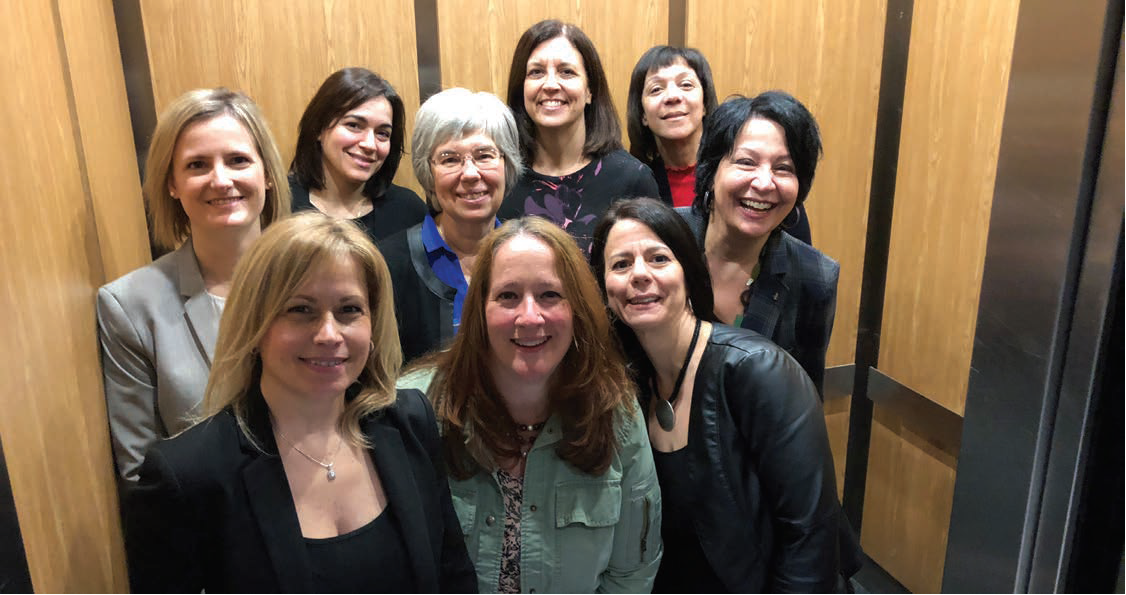Getting to know the MUHC recruitment team
There is a certain satisfaction that comes with meeting a set goal. For the McGill University Health Centre Human Resources recruitment team, that feeling comes with finding the perfect candidate for a position; a balancing act that incorporates meeting the needs of the organization and the aptitude of the candidate.

Clockwise from the front: Anna Christopoulos, Elisabeth Blais, Haroula Volakakis, Susan Lauzier, Catherine Robineau, Cynthia Lepage, Sandra Starna, Rita Diorio, Kim Salvetti
Every day, the recruitment team works closely together as they scan incoming CVs for potential talent, screen candidates for various positions across all sites, and actively seek out potential employees.
The team is separated into different recruitment categories. Each sub-team works in specific areas such as nursing, auxiliary services, trades, para-technical, technicians, clerical staff and professionals in both the clinical and administrative environments.
Being assigned to certain job categories doesn’t mean not looking beyond, especially when a compelling CV comes across one’s desk. Communication is a key part of the job; communicating with candidates, communicating with managers across all departments to understand their needs, and most importantly, communicating as a team.
“I may not be recruiting for the other sectors, but I will refer a good candidate to my recruiter colleagues. This referral works because we align hires with the MUHC vision and values. There is certain fit that we all look for, so we are all working from a common ground,” says Rita Diorio, a nursing recruiter.
“When we talk about fit, it’s the fit in the job, in the team, in the organization and it’s also finding staff that will prioritize the patient when making decisions on a daily basis in their jobs,” says Kim Salvetti, manager of the Recruitment team.
The job of a recruiter requires a specific set of skills, many of which come with experience. Collaboration, strong organization and planning know-how, and being a good listener are essential. This expertise helps the team to provide a personalized approach with both the candidates and the client. There is a very human aspect of the work being done. For the team, each open position is a small piece of a larger puzzle that is the MUHC. Every piece has its place and fit, and it is up to recruiters to help find the right match.
“I see MUHC recruiters who are personal, resilient; despite the numerous hurdles and high volume in the public sector and, strong collaborators who possess an impressive amount of industry experience and work ethic. We don't always see this in other industries and establishments,” says Sandra Starna, Associate Director of Human Resources.
“Recruitment is all about building relationships with the candidates and our managers which we develop before, during and after the recruitment process,” says recruiter Anna Christopoulous. “At the end of the day we are working for the patient. Listening to patients’ testimonials about the exceptional care they received at the MUHC is what keeps us going, and reminds us how important our role in the organization is.”
The team boasts a strong knowledge of the field, having the industry experience it takes to understand different jobs and areas of the healthcare field; a very important factor when recruiting. Together, they have accumulated 112 years of experience in the healthcare sector.
“The fact that some of us have worked in the field, it is easier for us to find a fit because we know the work. We’ve done the shift work, the weekends, the holidays,” says recruiter Catherine Robineau, who alongside Rita worked as a nurse at the MUHC for a large part of her career.
Building for the future
“We do a lot of school visits. Our goal is to recruit, but we also place students for internships, and they come back to us once they have graduated,” recruiter Elisabeth Blais explains. The team makes a point to connect with the future generation, from as early on as high school students, not only thinking about the present but also the future of the organization.
“We try to see the graduating classes to promote more of the diversity of jobs that are out there,” says Haroula Volakakis, a clerical, trades, and technical recruiter.
“The recruiting landscape has changed full circle, and it’s a very interesting time for our recruiting team,” says Sandra. “We are working hard in modernizing our hiring practices, rendering us more efficient and effective. We want to leave a lasting impression on our jobseekers and future employees.”
The team is using an array of different tactics, from finding the right places to post on the web in order to reach their target audience, utilizing recruitment tools such as LinkedIn, and tapping into one of their most powerful resources: the MUHC community itself.
“Hiring through referrals works for us and adds substantial value. We found that there is often a better culture fit and the retention rate is longer and we encourage it,” Sandra explains.
A human touch
In an organization like the MUHC, there is a large volume of work and many employee files to manage. Despite this, the team strives to make the hiring process a human and personal experience.
“We often become the person of reference for the people we hire, as we were their first contact. They rely a lot on us, and we work hard to refer them to the right people to answer their questions. Our goal is to be there for them and to support them in their integration at the MUHC,” says Elisabeth.
